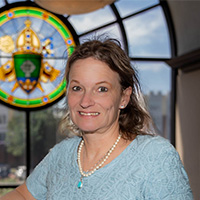Catholic News Herald reporter Christina Lee Knauss reflects on seeing faith in action as she visited some of the areas impacted by Tropical Storm Helene.
 HENDERSONVILLE/SWANNANOA — It was Oct. 4 in western North Carolina and the air smelled like mud.
HENDERSONVILLE/SWANNANOA — It was Oct. 4 in western North Carolina and the air smelled like mud.
Years ago when I visited the area to hike or enjoy a scenic drive, a breath of fall mountain air was cool and crisp. Now, it was heavy.
It reeked of the brown mud that boiled up from the bottom of rivers and cascaded down mountainsides in a deadly torrent that erupted from the catastrophic floods brought on when Helene ravaged the region on Sept. 26 and 27. The scent was at once coppery and cloying, and it clung to everything. Hours later, driving home, I smelled it on my clothes. It took heavy laundering to remove it.
This was the smell residents would be dealing with for weeks as they mopped and scraped and removed debris. I smelled it on a visit to a Catholic school in Hendersonville and while I visited the flood-ravaged town of Swannanoa, a place where pieces of houses, trucks and trailers lay in piles by the roadside and people’s possessions hung in the trees. A child’s wading pool, a picnic table, clothes, bedsheets and draperies are this year’s foliage along the riverbanks.
Mud and dirt covered everything, leaving asphalt roads looking more like dirt paths from the 19th century.
Looking around the only question a person seeing this for the first time could ask was: how? How could anyone come back from this? This is fall, people drive from hundreds of miles away to witness the explosion of color. Now – I saw no foliage. I did see a woman and her family sleeping in an SUV in the parking lot of a washed-out gas station.
Being a person of faith I tried to pray, but I didn’t know how. I didn’t know what to say. I didn’t know what to ask for these people in a place I loved that now looked hauntingly like a war zone.
So when I couldn’t find words I looked around for God’s answer in the movements of people. What I saw was prayer in action.
Immaculata Catholic School in Hendersonville had been turned into a well-oiled machine of supply meeting need, the gym transformed into a center of hope with thousands of donations from people all over North Carolina and across the country.
Paper towels. Toothbrushes. Pet food. Canned vegetables. A bag of combs and hairbrushes.
This is what happens when the water takes everything. Even the simplest items that fuel daily lives have been swept down river, and now some people can’t even reach for a comb to fix their hair.
Volunteers came to Immaculata and served people who pulled up in a never-ending stream of cars from early morning until dusk. They offered smiles, prayer, hope and encouragement alongside cases of bottled water.
In Swannanoa, hundreds of people turned out at St. Margaret Mary Church to greet Bishop Michael Martin when he visited. There were hugs, tears, and stories – some heroic, some tragic. But they were shared.
Across the street from the church, a community of its own had emerged from the destruction. Within days of the storm, Grovemont Park had been turned into a rare oasis of peace. Local restaurants and residents set up grills and portable kitchens, cooked hot meals and gave them away. Others with supplies to share set up little booths offering cleaning supplies, vegetables, paper products – and hope. Smiles. Children ran and played while all this went on.
In Hendersonville, Swannanoa and all the other mountain regions I love, this scene is repeating. People are coming together to do what they can. Volunteers bring in ATVs, land-clearing equipment, loads of coats and cleaning supplies. One group used mule trains to bring insulin, food and water to people stranded high on hillsides.
All while the smell of that mud hung in the air. It’s a scent that many people won’t be able to get out of their minds even after the dirt has been cleared. It smells like defeat. It smells like death.
But I’m convinced that the living presence of God I saw in the mountains will overcome the seemingly overwhelming tragedy that hit western North Carolina when the storms came.
Even as the cold sets in and some people are now sleeping in tents. There are new worries and new concerns as each day marches on. But the sun still shines on the mountains. There is still time to pause and drink in the beauty, even in the residue of disaster. And if you look, you can see God in action. The rebuilding will come. One bottle of water. One comb. One hot meal. One living prayer at a time.
— Christina Lee Knauss
Related news:
-
Bishop Michael Martin, OFM Conv.: Are we ready to walk with those in need?
-
Friends search for Arden parishioner who lived ‘humbly and charitably’
-
National Catholic Charities grant boosts diocese’s Helene relief efforts
- Charlotte Catholic students help Immaculata School prepare for reopening
- Grieving Swannanoa residents greet bishop
- Helene relief flows in








